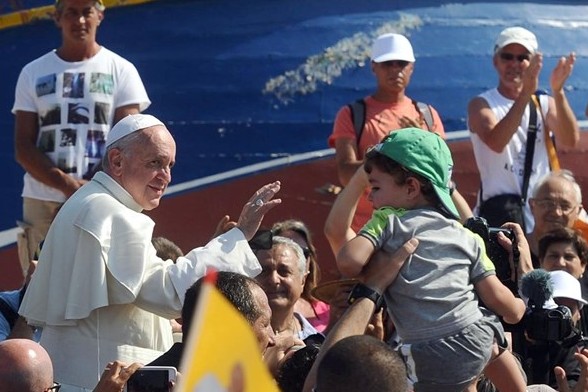The Annual Meeting of National Directors for the Pastoral Care of Migrants of the Catholic Bishops’ Conferences in Europe took place in Rome from 21 – 23 September.
About fifty representatives of twenty-four Catholic Bishops’ Conferences in Europe met for a two-day meeting of dialogue and exchange of opinions with the executives of the “Migrants and Refugees” Section of the Dicastery for the Promotion of Integral Human Development.
Bishop Raymond Field and Father Willie Purcell represented the Council for Immigrants of Irish Bishops’ Conference at the meeting.
At the center of the meeting, was an audience with the Holy Father that took place in the Vatican on the morning of Friday 22 September 22.
The meeting had began in the afternoon of the 21st with the greetings of Cardinal Josip Bozanić, head of the “Migrations” section of the CCEE Caritas in Veritate Commission. As he could not attend the meeting and he was at the end of his mandate, the Cardinal addressed a message to the participants in which he recalled the last years of the Commission’s work, showing the steady work and the developments of the pastoral care for migrants and refugees in Europe.
Prof. Gian Carlo Blangiardo and Prof. Simona Maria Mirabelli, respectively full professor and aid from Milan Bicocca University, presented an analysis of the survey carried out at the Catholic Bishops’ Conferences of Europe on the situation of migrants and their perception in the public opinion. The study of the material has allowed for identifying some key aspects: the needs and criticalities associated with the issue of refugees; the role of information and social / interpersonal and religious communication in the knowledge and representation of this issue; the perception of native population towards migrants and refugees; the actions and interventions of the Catholic Church in support of the populations of concern; the Church’s relationship with State authorities.
In summary, if the survey shows the Church’s inescapable ability to respond to the various challenges posed by the migration issue, at the same time, the analysis shows the need to improve openness, dialogue, collaboration, and exchange of resources among the various actors in this area.
In Rome, the National Directors have also faced the various challenges that human mobility today poses on the European States and the Christian community. The discussions have shown that everywhere in Europe there is attention and a welcoming attitude in the face of the current phenomenon of migration: an unprecedented, complex, and multifaceted event – said the participants -, a real exodus of those who are in most desperate need and desperately fight for their own future.
At the same time, there are many cultural or social difficulties that hinder the integration and the very perception of this people on the move. There is an evident urgency of an educational work which touches all society and the Christian communities themselves, to respond with generosity and necessary prudence to the challenge of reception and integration. In fact, it is necessary to go ahead in educating to the culture of the encounter.
Solidarity and fear are the two contrasting feelings, often evoked during the meeting, that well represent the current climate. If there are many experiences and demonstrations that show the great solidarity of peoples in Europe towards those who come to the Continent, at the same time, the National Directors have also repeatedly emphasized the widespread perception of fear and bewilderment among people, based on preconceptions and false stereotypes.
Pope Francis himself expressed his concern “about manifestations of intolerance, discrimination and xenophobia that have appeared in various parts of Europe. Often this reaction is motivated by mistrust and fear of the other, the foreigner, those who are different.” (Pope Francis to the participants of the Annual Meeting of National Directors for the Pastoral Care of Migrants of the Catholic Bishops’ Conferences in Europe, Vatican City, September 22, 2017).
To face this situation, the response of the Church is a renewed confidence and determination not to surrender before the current difficulties but continue with greater impetus and conviction in her pastoral work. As Cardinal Bagnasco said, “Let us not give up. If Jesus is with us, we will always be with everyone.”
Subsequently, in the Palazzo San Calisto, headquarters of the Dicastery for the Promotion of Integral Human Development, the persons in charge of the “Migrants and Refugees” Section shared with the participants the priorities and projects on which this Vatican Dicastery is working, particularly about the involvement of the Holy See and the Catholic Church in the process of preparing the “Global Compacts 2018.” The discussion then focused on the best way to create a co-ordination among those working on the pastoral care of migrants in Europe (Holy See, Catholic Bishops’ Conferences, and international ecclesiastical bodies).
The meeting concluded on Saturday, September 23, with a visit to the San Saba Center, run by the Centro Astalli Association (the Jesuit Service for Refugees in Italy), hosting asylum seekers and international protection holders.
ENDS


